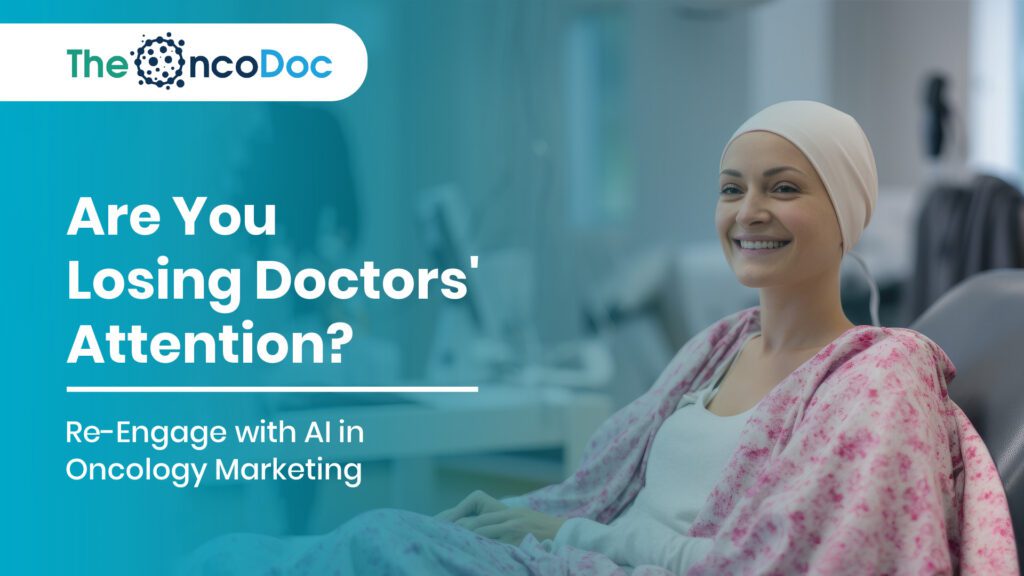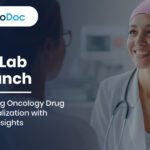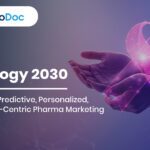Abstract
The oncology landscape in the US is rapidly evolving, marked by scientific breakthroughs, an explosion of data, and increasingly complex treatment paradigms. Simultaneously, healthcare professionals (HCPs), particularly oncologists, are facing unprecedented demands on their time, leading to a significant challenge for pharmaceutical companies to capture and sustain their attention. Traditional marketing approaches are proving less effective in this dynamic environment. This article delves into the critical issue of declining doctor engagement in the digital age, particularly within oncology. It provides a comprehensive analysis of the factors contributing to this disengagement, including information overload, time constraints, and the need for personalized, relevant content. We will explore how Artificial Intelligence (AI) is revolutionizing pharmaceutical marketing, offering innovative solutions to re-engage oncologists. Through an examination of predictive analytics, natural language processing, machine learning, and AI-powered content personalization, this article outlines actionable strategies for pharma managers to optimize their engagement initiatives. The discussion is supported by detailed insights into the US oncology market, illustrating how AI-driven approaches can deliver highly tailored, valuable interactions, ultimately enhancing scientific exchange, improving educational outcomes, and fostering stronger relationships between pharma and HCPs.

Introduction: The Shifting Sands of Physician Engagement in Oncology
The pharmaceutical industry has long relied on traditional engagement models, from sales representatives to medical conferences, to educate healthcare professionals about new therapies. However, the 21st century has ushered in an era of profound transformation, particularly within the highly specialized and data-intensive field of oncology. Oncologists in the US are grappling with an ever-increasing volume of scientific literature, complex clinical guidelines, and a diverse patient population demanding personalized care. This deluge of information, coupled with significant time pressures, has created a formidable barrier to effective communication from pharmaceutical companies.
The challenge is multi-faceted. On one hand, pharmaceutical companies possess invaluable scientific data and educational resources that are crucial for optimal patient care. On the other, the traditional “spray and pray” approach to marketing – sending generic messages to broad audiences – is no longer resonating. Oncologists are actively seeking highly relevant, concise, and easily digestible information that directly addresses their specific practice needs and patient challenges. If pharma companies fail to adapt, they risk not only losing the attention of these critical stakeholders but also hindering the adoption of innovative treatments and the overall advancement of cancer care.
This article aims to provide pharma managers with a strategic roadmap to navigate this complex terrain. We will dissect the root causes of physician disengagement in oncology and, crucially, present a compelling case for how Artificial Intelligence is not just a buzzword but a transformative force capable of redefining and revitalizing physician engagement strategies. By embracing AI, pharma can move beyond transactional interactions to foster truly meaningful, value-driven relationships with oncologists, ensuring that vital scientific information reaches those who need it most, precisely when they need it.

The Erosion of Attention: Why Oncologists Are Tuning Out
Several interconnected factors contribute to the decreasing attention span and engagement levels of oncologists with traditional pharmaceutical marketing efforts. Understanding these drivers is the first step towards developing effective re-engagement strategies.
Information Overload and the “Attention Economy”
The sheer volume of medical information generated daily is staggering. In oncology, new research, clinical trial results, and treatment guidelines are published at an unprecedented rate. Oncologists are constantly bombarded with emails, journal articles, conference invitations, and marketing materials from multiple sources. This creates an “attention economy” where their most valuable resource – time and cognitive focus – is fiercely competed for. Generic or irrelevant communications quickly get lost in the noise, filtered out, or simply ignored.
Time Scarcity: The Pressures of Modern Oncology Practice
Oncologists in the US operate under immense time pressure. Their days are filled with patient consultations, complex treatment planning, multidisciplinary team meetings, administrative tasks, and continuing medical education. The average time a physician can dedicate to engaging with pharmaceutical representatives or marketing materials has significantly dwindled. Any engagement that is perceived as time-consuming, unhelpful, or lacking immediate value is unlikely to succeed. This necessitates communications that are succinct, directly actionable, and respectful of their limited availability.
The Demand for Personalization and Relevance
Just as consumers have come to expect personalized experiences in their daily lives, oncologists now expect the same from their professional interactions. They are no longer content with one-size-fits-all messages. Instead, they seek information tailored to their specific sub-specialty (e.g., breast cancer, lung cancer, hematologic malignancies), geographic location, patient demographics, prescribing habits, and even their preferred learning styles. A lung cancer specialist, for example, has little interest in extensive information about a new melanoma drug, unless it relates to a broader scientific principle or a co-morbidity.
Digital Fatigue and Channel Proliferation
While digital channels offer unparalleled reach, they also contribute to fatigue. Oncologists are present on various platforms – professional networking sites, medical news portals, social media, and email. However, simply having a presence on these channels is insufficient. Without a cohesive, data-driven strategy, digital efforts can feel disjointed and contribute to the very information overload they aim to alleviate. The challenge is not merely to be present but to be present effectively, delivering value in the right format, at the right time, on the right channel.
Evolving Regulatory Landscape and HCP Interaction Preferences
The regulatory environment around HCP interactions in the US remains stringent. This has led to a more cautious approach from pharma, sometimes resulting in standardized, less engaging communication to ensure compliance. Furthermore, the preferences of oncologists themselves are evolving. Younger generations of physicians, in particular, are digital natives who prefer on-demand, self-directed learning and peer-to-peer exchange over traditional sales calls.
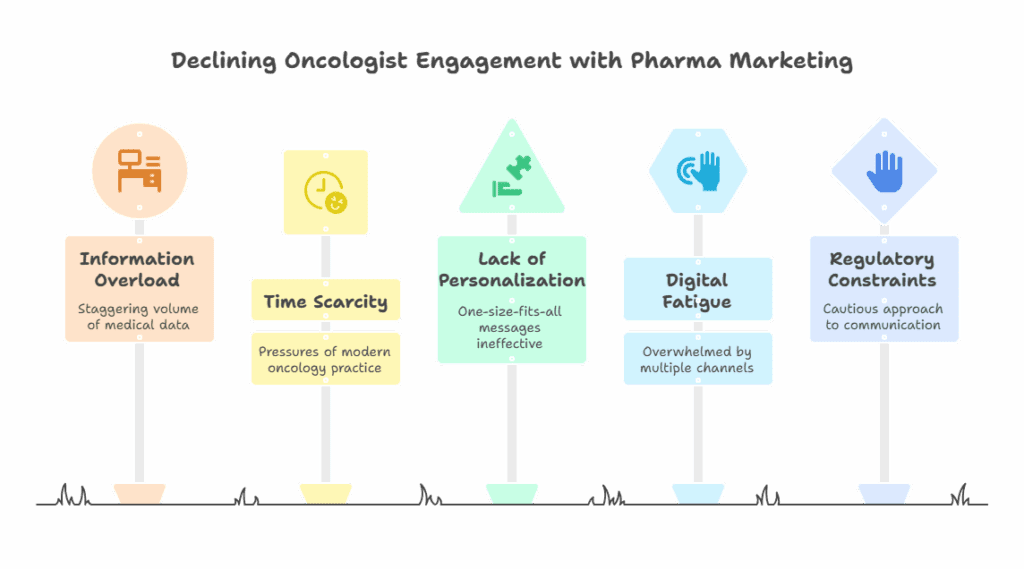
The AI Imperative: Re-Engaging Oncologists in the Digital Age
Artificial Intelligence is no longer a futuristic concept but a present-day reality offering unparalleled opportunities for pharmaceutical companies to overcome the challenges of physician engagement. By leveraging AI, pharma can move from a reactive, broad-brush approach to a proactive, hyper-personalized, and highly efficient engagement model.
Understanding AI in Pharma Marketing
AI encompasses a range of technologies that enable machines to simulate human intelligence. In the context of marketing, this includes:
- Machine Learning (ML): Algorithms that learn from data to identify patterns and make predictions without explicit programming. This is the backbone of personalization.
- Natural Language Processing (NLP): Enables computers to understand, interpret, and generate human language. Crucial for analyzing unstructured data (e.g., medical literature, social media conversations) and generating human-like content.
- Predictive Analytics: Uses statistical algorithms and machine learning techniques to predict future outcomes based on historical data. Essential for anticipating oncologists needs and optimizing engagement.
- Generative AI: Capable of creating new content, from text to images, based on learned patterns. Holds immense potential for personalized content generation.
AI-Powered Strategies for Re-Engagement
- Hyper-Personalized Content Delivery:
- The Problem: Generic content is ignored.
- The AI Solution: AI algorithms can analyze vast datasets, including an oncologist’s digital footprint (website visits, content downloads, conference attendance, professional affiliations, prescribing patterns – where permissible and anonymized), and even public scientific contributions. This allows for the creation of incredibly granular profiles.
- Implementation: Based on these profiles, AI can recommend specific articles, webinars, clinical trial updates, or educational modules that are directly relevant to that individual oncologist’s interests and practice needs. For example, an oncologist specializing in HER2+ breast cancer in a rural setting might receive information on a new oral therapy with data on real-world efficacy in community practices, rather than a broad overview of all breast cancer treatments. AI can also dynamically adjust content recommendations based on an oncologist’s real-time interaction with materials.
- Predictive Engagement and Proactive Outreach:
- The Problem: Missing opportunities for timely interaction.
- The AI Solution: Predictive analytics can forecast which oncologists are most likely to be receptive to certain information or engagement types at a particular time. By analyzing historical engagement data, geographic trends, disease prevalence data, and even external market signals, AI can identify “signals of intent.”
- Implementation: If an oncologist is researching a specific gene mutation associated with a new therapy, AI can trigger a personalized alert to their preferred channel (e.g., an email with a link to a relevant publication or a notification on a professional platform), offering timely and highly valuable information. This moves away from random outreach to intelligently timed, needs-based communication.
- Optimizing Channel and Format:
- The Problem: Delivering the right message through the wrong channel or format leads to disengagement.
- The AI Solution: AI can determine an oncologist’s preferred channels (e.g., email, dedicated medical portals, virtual assistant, sales rep interaction) and even the optimal format (e.g., short video, detailed white paper, interactive infographic, podcast).
- Implementation: For an oncologist who frequently engages with short video summaries of clinical trials, AI will prioritize delivering information in that format. Conversely, if an oncologist prefers in-depth PDF whitepapers, AI ensures that content is delivered accordingly. This respects their individual learning and consumption habits, significantly increasing the likelihood of engagement.
- AI-Powered Content Generation and Curation:
- The Problem: Producing high-quality, relevant content at scale is resource-intensive.
- The AI Solution: Generative AI, including Large Language Models (LLMs), can assist in drafting initial content, summarizing complex research papers, creating executive summaries, or even generating outlines for educational materials. NLP can also be used to quickly scan and curate vast amounts of existing scientific literature to identify the most relevant pieces for specific oncologist profiles.
- Implementation: While human oversight remains critical for scientific accuracy and compliance, AI can accelerate the content creation process, enabling pharma to produce more personalized and timely materials. For example, an AI could quickly summarize the key findings of a new Phase III oncology trial into a bulleted list suitable for a busy clinician, tailored to their specialty.
- Enhancing Sales Representative Effectiveness:
- The Problem: Sales reps often struggle with generic messaging and lack real-time insights into an oncologist’s immediate needs.
- The AI Solution: AI provides sales reps with intelligent insights and recommendations before and during interactions. This includes understanding the oncologist’s preferred communication style, recent research interests, specific patient challenges, and engagement history with the company.
- Implementation: An AI-powered CRM system can suggest relevant talking points, patient case studies, or scientific data to a sales rep based on the oncologist’s profile, making each interaction more valuable, personalized, and efficient. This transforms the sales rep into a highly informed, trusted resource rather than just a product pusher.
- Real-time Feedback and Continuous Optimization:
- The Problem: Difficulty in measuring the true impact of engagement efforts and adapting strategies quickly.
- The AI Solution: AI continuously analyzes engagement data (open rates, click-through rates, time spent on content, attendance at webinars, feedback forms, prescribing data where applicable and anonymized). It identifies what works and what doesn’t, allowing for immediate optimization.
- Implementation: If a particular type of email subject line is consistently ignored by a segment of oncologists, AI can identify this pattern and recommend alternative approaches, testing different messaging or delivery times to improve engagement. This iterative, data-driven approach ensures that engagement strategies are constantly refined for maximum impact.
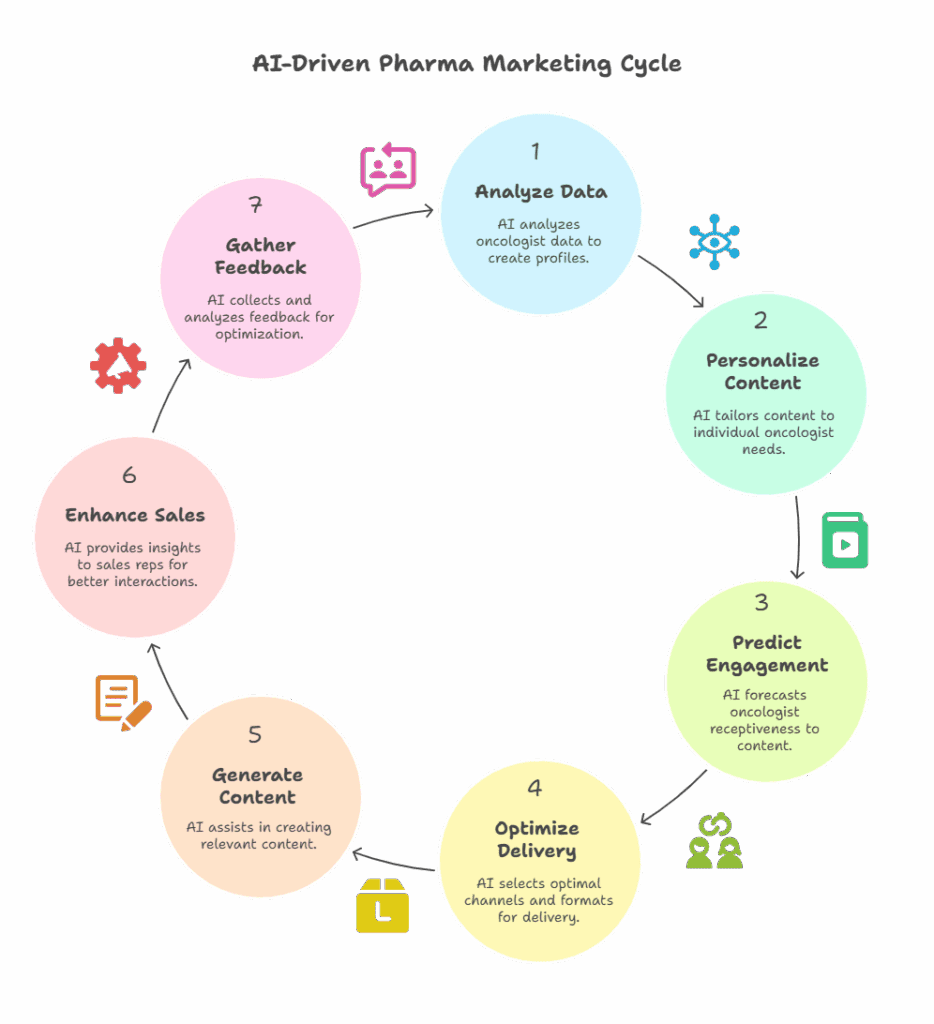
The US Oncology Market: A Case for AI-Driven Transformation
The US oncology market is characterized by several factors that make AI adoption not just beneficial, but essential:
- High Specialization: Oncology is highly sub-specialized (e.g., neuro-oncology, GI oncology, heme-oncology). AI allows for granular targeting within these sub-specialties, ensuring highly relevant communication.
- Rapid Innovation: The pace of new drug approvals and therapeutic advancements in oncology is unparalleled. AI can help pharma keep oncologists abreast of these breakthroughs in a digestible and timely manner.
- Data-Rich Environment: The US healthcare system generates enormous amounts of data (clinical trial data, real-world evidence, claims data). AI is uniquely positioned to extract meaningful insights from this data to inform engagement strategies.
- Value-Based Care: The shift towards value-based care models means oncologists are increasingly focused on outcomes. AI can help tailor information that highlights the clinical and economic value of therapies.
- Diverse Practice Settings: From large academic medical centers to community oncology practices, AI can adapt engagement strategies to suit the unique needs and resource availability of different practice environments.

Implementation Challenges and Considerations
While the potential of AI is immense, successful implementation requires careful planning and consideration:
- Data Quality and Integration: AI is only as good as the data it’s fed. Ensuring high-quality, clean, and integrated data from various sources (CRM, marketing automation, medical affairs, external data) is paramount.
- Ethical AI and Bias: Ensuring AI algorithms are fair, unbiased, and compliant with privacy regulations (HIPAA, etc.) is crucial. Transparency in data usage and algorithm design is essential.
- Talent and Skills: Pharma companies need to invest in developing or acquiring talent with expertise in data science, AI, and machine learning, alongside traditional marketing and medical affairs professionals.
- Change Management: Adopting AI requires a cultural shift within the organization. Employees need to understand how AI complements their roles and enhances their effectiveness, rather than replacing them.
- Regulatory Compliance: All AI-driven engagement must adhere to strict pharmaceutical marketing regulations in the US, particularly regarding promotion, off-label communication, and patient data privacy. AI tools must be designed with compliance built in from the ground up.
Conclusion: Reclaiming Attention, Driving Innovation
The era of passive physician engagement in oncology is over. Pharma managers in the US face a critical juncture: continue with outdated methods and lose the attention of invaluable medical professionals, or embrace the transformative power of Artificial Intelligence to redefine engagement. AI offers a pathway to not just reclaim, but to optimize and elevate the relationship between pharmaceutical companies and oncologists.By moving beyond generic outreach to hyper-personalized, data-driven, and timely interactions, pharma can ensure that critical scientific information is delivered effectively, fostering better educational outcomes and ultimately contributing to improved patient care in oncology. The investment in AI is not merely a marketing expenditure; it is an investment in the future of scientific exchange, collaborative innovation, and the sustained health of the oncology ecosystem. Those who strategically adopt AI will not only re-engage doctors but will also emerge as leaders in an increasingly competitive and complex market, ensuring that groundbreaking therapies reach the patients who need them most. The question is no longer if AI will revolutionize oncology marketing, but how quickly pharma managers will harness its potential to forge stronger, more meaningful connections with the oncologists at the forefront of cancer care.
The Oncodoc team is a group of passionate healthcare and marketing professionals dedicated to delivering accurate, engaging, and impactful content. With expertise across medical research, digital strategy, and clinical communication, the team focuses on empowering healthcare professionals and patients alike. Through evidence-based insights and innovative storytelling, Hidoc aims to bridge the gap between medicine and digital engagement, promoting wellness and informed decision-making.

